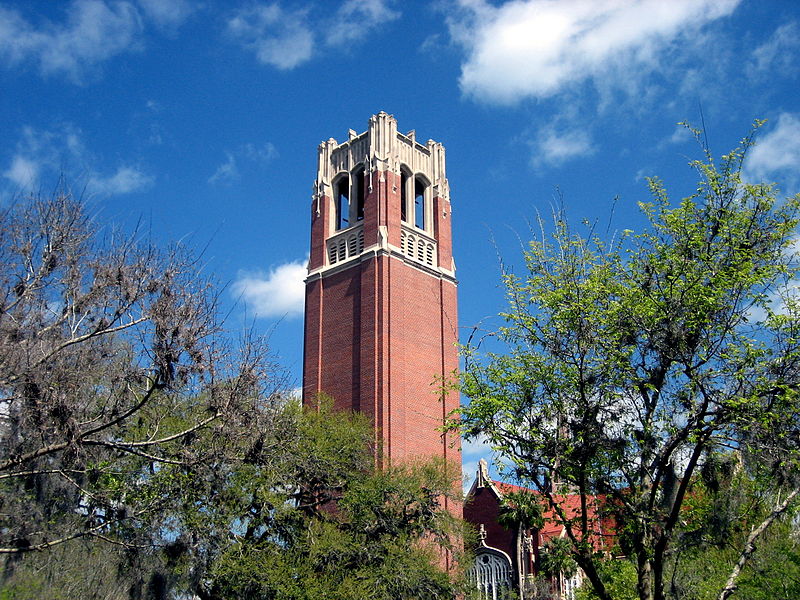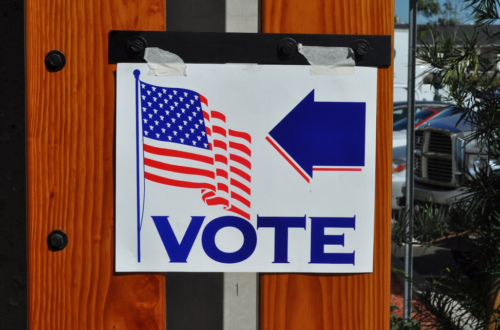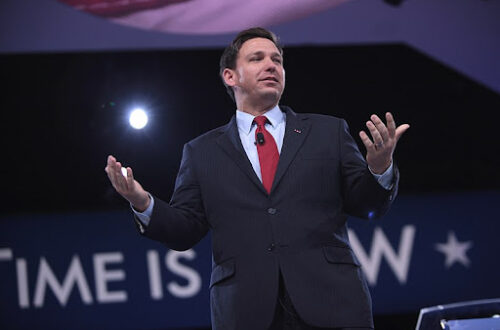Last month, an invitation to a high-dollar fundraiser for Florida Gov. Ron DeSantis’s political committee was shared by Politico reporter Matt Dixon on Twitter. The host was Mori Hosseini, chair of the University of Florida’s board of trustees.
Just a few hours later, the Florida GOP and Friends of Ron DeSantis political committee clarified they had not heard of such an event — let alone had a chance to approve of it taking place — and retracted Hosseini’s invitation.
Hosseini is a longtime supporter of DeSantis: he appears several times on the list of individual donors to his committee.
Hosseini’s offer and the swift walkback by those in DeSantis’s circle are particularly interesting as just four months earlier Hosseini was reappointed to his position on the board by the very same governor he hopes to reelect.
Dr. Beth Rosenson, a political science professor at the University of Florida who studies political ethics, says that Hosseini likely did not break any laws or regulations, but there may be a conflict of interest — or the appearance of a conflict of interest — in an appointed academic official financially supporting the political operations of the person who put him in his position.
“It would be worse if someone was using their position on the board of trustees for financial gain,” Rosenson said in an interview with Florida Political Review. “But all things being equal, it would probably be better if somebody, when they were on the board of trustees, wasn’t taking a high profile role in a political campaign.”
She noted that it was normal and permissible for Hosseini to make political donations, but taking such a prominent position as a fundraiser may present appearance problems for both the university and the DeSantis campaign.
“People in a position of power have to be attentive not just to what’s legal, but also how things appear,” Rosenson said.
This is not Hosseini’s first foray into the murky waters of Florida campaign finance, either. In 2018, Hosseini was named in an FEC complaint with then-Governor and U.S. Senate candidate Rick Scott, R-Florida, for allegedly donating before his official announcement of candidacy. Other appointed university trustees, such as Bill Heavener, also gave Scott high dollar amounts that year.
The most recent incident is the latest in a number of questionable stories about ethics, politics and higher education in the Sunshine State.
Last month, Florida State University ran into controversy surrounding a proposal to appoint Florida Education Commissioner Richard Corcoran to serve as the university’s president.
Corcoran’s candidacy was immediately questioned by many in the FSU community. A member of the Republican Party, Corcoran previously served as speaker of the Florida House of Representatives before being nominated to his current post by DeSantis.
Advocates said someone with his political experience in Tallahassee would be a great champion for the school. Meanwhile, critics voiced concerns over his perceived partisanship, staunch conservatism, and lack of academic experience outside of politics.
However, it was not Corcoran’s politics that ultimately ended his candidacy. It was the ethics dilemma posed by his nomination in the first place. As education commissioner, Corcoran sits on the State University System’s Board of Governors, which has final say over presidential appointments.
His candidacy was criticized by the Southern Association of Colleges and Schools, which threatened to revoke FSU’s accreditation over the conflict of interest created by nominating Corcoran to a position he has voting power over.
FSU’s trustees — political appointees, much like UF’s — pushed back, arguing that Corcoran could have surely warned the trustees of a potential ethical dilemma or recused himself from his position if nominated.
Others argued that SACS was violating its own ethical regulations by sending such a message to one of its member institutions during such an important process. Trustees Alan Levine and Craig Mateer decried SACS’s threat as excessive external pressure on what should be an internal decision for the university’s board of trustees.
Ultimately, Corcoran did not become a finalist for the position of president, which was awarded to Richard McCullogh, the vice provost for research at Harvard University. The university’s general counsel, Carolyn Egan, warned the search committee that forwarding Corcoran as a candidate would “pose some risks to FSU.”
Meanwhile, faculty at Florida Atlantic University have voiced concerns about the growing power of their own state-appointed, Republican-leaning trustees.
A proposed policy change at FAU would put tenure in the hands of the trustees rather than the university president alone. While trustees hold this power at many other schools already, many FAU professors were alarmed by politically charged remarks on the matter made by Barbara Feingold, a newly appointed member of the board.
Feingold stated that both she and DeSantis had concerns about the university’s existing tenure process, or even the concept of tenure at all. Professors expressed fears that transferring tenure power to a politically appointed board for seemingly political reasons would be a serious threat to academic freedom and faculty’s intellectual independence.
Yet concerns about academic freedom are not limited to the professors themselves. Republicans in the Florida Senate proposed multiple bills regarding “academic freedom” and “viewpoint diversity.”
One bill, SB 264, would have required the Florida College System to annually assess intellectual freedom and viewpoint diversity at its institutions and would bar colleges from “shielding students from certain speech.” Another bill, SB 2126, would have created a “student and faculty bill of rights” to prevent “discrimination on the basis of their political or religious beliefs.”
Both bills were motivated by conservative fears over liberal bias in academia, an issue DeSantis himself made one of his top issues when he first ran for governor in 2018.
Although neither passed, controversial bills in the legislature and incidents involving DeSantis-appointed university trustees reflect a year of tense relations between academia and government.
“It’s a hot issue in Florida lately,” Rosenson said. “There are Republican legislators who are not happy with what they see going on in state universities, which obviously get a lot of taxpayer money.”
Check out other recent articles from Florida Political Review here.
Featured Image: Century Tower at the University of Florida. Unmodified image by Kate Haskell used under a Creative Commons license (https://bit.ly/3ppNIlQ).





